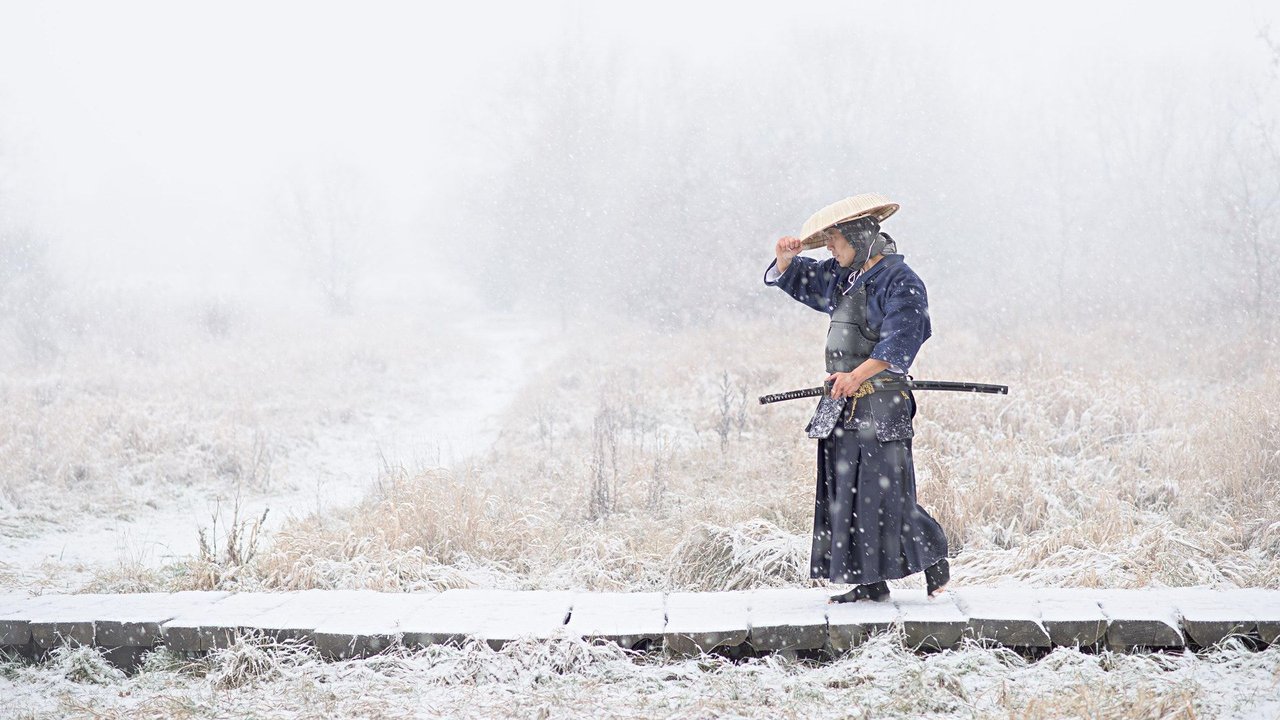
The Battle of Bun’ei. Chapter Five
The day of the Great Bun’ei Extravaganza dawned with the meteorological malevolence of a particularly disgruntled deity.
Not content with mere snow, the heavens pelted Higashikuma with hailstones the size of frozen peas, driven by a wind that could strip paint from a battleship, as if the gods themselves were the pelting village for its sins against both history and meteorology.
The villagers, swaddled in layers of thermal underwear and existential dread, shuffled about the lakeshore in their ill-fitting samurai costumes. The swords, made of plastic and optimism, drooped in the cold. The only thing invincible about the warriors of Bun’ei was their collective hangover.
The Saudi delegation arrived in a helicopter that looked far too expensive to be anywhere near Bun’ei. Out stepped five men in flowing robes, their faces a study in polite horror, and behind them, Ayumi Sato — Miss Tokyo herself — now pressed into service as their guide, interpreter, and, judging by her expression, emotional support animal. She moved with the effortless grace of someone who understood that the true art of observation lay in maintaining a healthy distance from the grotesque. She was, to the Saudis, an inexplicable but undeniably elegant guide through this baffling tableau of rural Japanese insanity.
Mayor Katsuhiro, sweating in his armor (which was actually a lacquered rice cooker and a pair of shin guards), bounded up to the villagers, clapping his hands and bellowing, “Come on! Show them the spirit of Bun’ei! Fight! Fight like real samurai! And then — into the lake! Show them our valor!”
The villagers looked at him as if he’d just suggested they eat the plastic swords. Even the sake, which had been flowing since breakfast, was no match for the hail and the prospect of hypothermia. Old Mrs. Nakamura, who had been conscripted as a Mongol, was now using her shield as an umbrella and muttering curses in three dialects.
The Saudis, meanwhile, huddled under a tent, their faces frozen in a rictus of polite confusion. One of them tried to take a photo, but his phone froze and died, much like his enthusiasm for cultural exchange.
Ayumi, ever the professional, attempted to narrate the “battle” in three languages (English, Japanese and Farsi, which she thought was Arabic), but her voice was lost in the wind and the villagers’ half-hearted grunts. The musicians, imported at great expense from the city, played a medley of traditional war songs and “Let It Go” from “Frozen”, which seemed more appropriate by the minute.
Mrs. Mina Matsuda, whose bold and slightly drunken gaze defying the very concept of cold, had clearly reached a state of inebriation where logic and temperature had ceased to be relevant. Her cheeks were flushed the colour of a particularly robust pickled radish, and her eyes held the wild glint of a woman on the verge of either enlightenment or a public indecency charge. “To hell with it!” she roared, her voice echoing across the lake. “I don’t care about the cold, I don’t care about the snow, and I don’t care about your tourists! This is our Holiday!”
With a heroic wobble, she hurled herself into the icy water, sending up a geyser of slush and cabbage-scented bravado. For a moment, there was silence. “Mina-san’s in! I’m in!” bellowed a farmer, his fake samurai helmet askew, and promptly plunged after her, followed by a surging crowd. Then, as if released from a spell, the rest of the villagers — emboldened by alcohol, peer pressure, and the promise of roast pork — charged after her, plunging into the lake with a cacophony of shrieks, splashes, and creative profanity.
The mayor, not to be outdone (and sensing a photo opportunity), threw off his rice cooker and dove in, emerging moments later with a triumphant bellow. The musicians, who had long since lost feeling in their fingers, shrugged, put down their instruments, and leapt in after them, their city-bought wigs floating like drowned rats.
Spluttering and shivering, the mayor turned to the musicians, his teeth chattering in time with the hail. “Well, now let the Saudis dive too! Show them real samurai valor!”
The lead musician, who had once played for the Emperor’s cousin’s dog’s birthday, shook his head. “They’ve already flown away. They froze, they got bored, and they flew away.”
The mayor blinked, then shrugged, water streaming from his ears. “Who cares! This is our holiday! Today, we are samurai! Today, we are kamikaze! Banzai!”
A ragged, drunken chorus of “Banzai!” echoed across the frozen lake, the sound a testament not to ancient valor, but to the enduring power of misguided enthusiasm and copious amounts of cheap alcohol.
Thus, the Battle of Bun’ei was, for the first time in a decade, a genuine success- at least by the standards of Bun’ei, where the only thing more enduring than tradition was the hangover that followed.